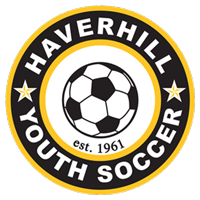Goal Safety
Haverhill Youth Soccer recommends use of the following guidelines regarding the installation, use, and storage of soccer goals. As advocates for the healthy development of children, we need to be concerned with soccer goal post safety. While these guidelines should be effective in reducing the risk of goal-related injuries, they should not be construed as the only methods for minimizing injuries associated with soccer goals.
Soccer Goal Injuries and Deaths
According to the US Consumer Product Safety Commission (CPSC), most soccer goal post related deaths and injuries involved either unsecured or homemade goals. Injuries frequently occurred during horseplay such as climbing on the goal or attempting to do chin-ups, thereby tipping the goal over. All goals, whether homemade or manufactured, should be properly secured to the ground to avoid injuries or deaths associated with tip-over.
Anchoring Soccer Goals
There are several different ways to properly anchor soccer goals. The number and type of anchors used will depend on factors such as soil type and goal weight. Anchor types include:
Auger-style anchors that are screwed into the ground.
Semi-permanent anchors, which require a permanently secured base buried underground with tethers or bolts to secure the goal.
Peg, stake or j-hook style anchors that are driven into the ground.
Sandbags or counterweights for indoor facilities.
Goal Storage
The CPSC reports that most accidents occurred when the goal was unattended. When goals are not being used, always take appropriate steps to secure goals such as:
Place the goal frames face-to-face and secure them at each goal post with a lock and chain.
Lock and chain to a suitable fixed structure such as a permanent fence.
Lock unused portable goals in a secure storage room after each use.
Remove the net, if possible.
Fully disassemble the goals for seasonal storage.
Conclusions/Safety Tips
HYS asks that coaches, parents, and players follow these safety guidelines:
Securely anchor or counter-weight portable goals at all times.
Store movable soccer goals in a place where children can not access them.
Never permit anyone to climb on the net or goal framework.
Remove nets, if possible, when goals are not in use.
Check all connecting hardware before every use and replace damaged or missing anchors immediately.
Ensure safety/warning labels are clearly visible.
Always exercise extreme caution when moving goals and allow adequate manpower to move goals of varied sizes and weights. Movable soccer goals should only be moved by authorized adults.
Movable soccer goals should only be used on level (flat) fields
Instruct players to avoid unsafe use of goals.
Updated April 18, 2018
